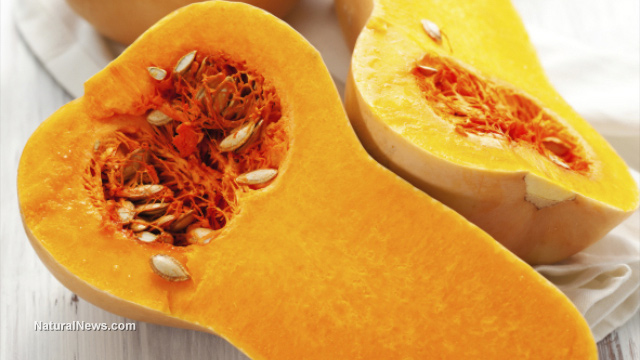
Advertisement
When it comes to fall flavors, butternut squash really gives pumpkin a run for its money. Sweet and versatile, it can be roasted crisp or pureed smooth and is delicious at every stage in between. Butternut squash also adds warmth and comfort to virtually any fall dish, from hearty pasta bowls to creamy soups and rich stuffings.
But more than just being a delicious ingredient, butternut squash is also rich in essential vitamins, minerals, potent antioxidants and other beneficial compounds that support optimal health and well-being.
Incorporate this fall favorite into your diet today to reap its many nutritional benefits.
Top health benefits of butternut squash
Including butternut squash in your meal plan may provide certain health benefits, such as:
1. Helps control blood pressure
One cup of cooked butternut squash provides 582 milligrams (mg) of potassium, which is around 12 percent of your daily requirement of the mineral. One of potassium’s most well-established benefits is maintaining healthy blood pressure levels. Potassium does that by relaxing the blood vessels, thereby facilitating better circulation.
Maintaining healthy blood pressure levels is important because high blood pressure can severely increase your risk of heart disease and its complications, including heart attack and stroke.
2. Helps lower blood sugar
Even though butternut squash tastes sweet, it’s perfectly safe to eat for those with diabetes, a condition marked by high blood sugar levels. That’s because butternut squash is loaded with soluble fiber, a type of fiber that helps improve blood sugar levels by slowing the absorption of sugar in the gut.
3. May lower your risk of asthma
Butternut squash may even lower your risk of asthma thanks to its beta-carotene content. This compound is a type of carotenoid, a class of over 700 naturally occurring pigments in plants. Beta-carotene is the red-orange pigment responsible for the vibrant peels of vegetables like carrots and pumpkins.
Multiple studies have shown that people who eat foods with high levels of beta-carotene appear to have a lower risk of asthma. The mechanisms behind this benefit aren’t well understood, but there does seem to be a correlation between beta-carotene consumption and asthma risk at the very least.
4. Keeps your skin and hair healthy
Want younger-looking skin and shiny hair? Add butternut squash to your diet. This vegetable is rich in vitamin A, which is needed for healthy sebum production.
Sebum, which is produced in the hair follicle, disperses over the surface of the scalp to prevent moisture loss, which can lead to dry hair and scalp. Vitamin A also plays a key role in the growth of all bodily tissues, including skin and hair.
Butternut squash is also an excellent source of vitamin C. This essential vitamin stimulates your body’s natural production of collagen, a structural protein found in your skin and hair.
5. Supports a healthy digestive system
Like other winter squashes, butternut squash contains a modest amount of insoluble fiber. This type of fiber attracts water to and adds bulk to stool, making it easier to pass. This has the effect of keeping you regular. You’re also less likely to experience bloating and constipation if you regularly get enough insoluble fiber.
6. Boosts your immune system
Butternut squash contains high levels of vitamins C and A, two key nutrients for healthy immune function. Vitamin C works by supporting the body’s natural production of white blood cells, which help protect your body from infection-causing bacteria and viruses. Vitamin A, on the other hand, helps lower inflammation, which is at the root of many chronic diseases.
Recipe for cinnamon roasted butternut squash
For a simple fall side dish, try this easy cinnamon roasted butternut squash recipe.
Ingredients for 4 servings:
- 3 pounds butternut squash, peeled and cubed
- 1 1/2 tablespoons extra-virgin olive oil
- 1 1/2 tablespoons organic maple syrup
- 1 tablespoon chopped rosemary
- 1 3/4 teaspoons kosher salt
- 3/4 teaspoon ground cinnamon
- 1/2 teaspoon ground black pepper
Preparation:
- Place your oven racks in the upper and lower thirds of your oven. Preheat it to 400 F.
- Lightly grease two baking sheets. Set aside.
- Place the squash in a bowl. Drizzle with olive oil and maple syrup. Add salt, cinnamon and pepper.
- Toss the cubes to coat, then divide them between the two baking sheets. Discard any excess liquid.
- Place the sheets in the upper and lower thirds of your oven. Bake for 15 minutes.
- After 15 minutes, turn the cubes over with a spatula. Bake for 15 minutes or until the squash is tender.
- Remove from the oven and sprinkle with chopped rosemary. Serve warm and enjoy.
Butternut squash is bursting with essential nutrients, as well as fiber and antioxidants. Incorporate it into your recipes this fall to reap its many impressive health benefits.
Sources:
Advertisements







